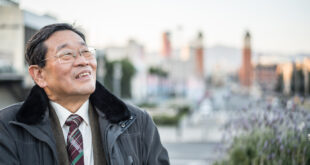By Mike Milstein
How did you think about life when you were twenty? How do you think about life now that you are older? Four of us – Andrea Campbell, Annie Henry, Mike Milstein, and Jay Shapiro, who range in age from the fifties to the seventies, recently explored this question on Fresh FM.
All four of us remember our twenties as being a wonderful time in life. We felt immortal, in possession of truth, and having bodies that could do all we might ask of them. When we did think about mortality in our twenties it was not about us dying but only to pity older people their difficulties. In fact, we were sure that our skin "would never wrinkle like Grandma's." It was a time of being "impatient, wanting to get on with life's adventures, of being treated as an adult without having taken on much adult responsibilities, of being invincible. Nothing was impossible."
But that was then and this is now. Andrea and Annie are both baby boomers. Thirty some years past their twenties they are aware of being in a major life transition. For Andrea this means coping with health issues and doing all she can "to stay independent and growing." For Annie this translates to "reflecting more–sorting out what she can do, what she wants to do, and what she doesn't want to do." Forty some years past his twenties, Mike can "see the reality of an end of the runway of life, still in the distance, but having a conscious presence for him that wasn't there until recently."
Fifty some years past his twenties Jay looks in the mirror and sees his grandmother�s wrinkles in his own face and wonders how he will confront his own death.
Life does take its toll on our earlier beliefs and certainties. We mount up life experiences, draw on the reservoirs of our bodily strength and well being, and come to realize our own mortality as the sands of time etch their way into our very being.
In the process the etching can also lay bare our inner core. For most of us ego is not as much a driving force as it was earlier in life so there is more opportunity to connect with soul and spirit. Similarly, the human body proves to have frailties so we learn to lean less on 'doing' and give more focus to 'being,' exploring our connections with others and with our place in the universe.
Life can take on a deeper meaning. It is our choice: "We can become more open and ready for this possibility. If we don't we just float through life and don't taste its fullness." If we choose to do so we can "realize that we are more than our bodies and open up to the blossoming of other aspects of ourselves."
Note: This article was published in The Leader, Nelson, NZ. It summarizes an interview aired on Nelson’s Fresh FM that was conducted by Annie Henry for the Conscious Ageing Network (CAN), which is sponsored by Age Concern, Nelson. If you want to share your thoughts with CAN or wish to know when interviews will be aired, send an email to agewell@xtra.co.nz.







Join the Discussion
Type out your comment here:
You must be logged in to post a comment.